|
|
|
Sort Order |
|
|
|
Items / Page
|
|
|
|
|
|
|
| Srl | Item |
| 1 |
ID:
056649
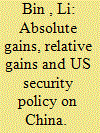

|
|
|
| 2 |
ID:
133602
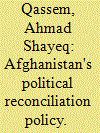

|
|
|
|
|
| Publication |
2014.
|
| Summary/Abstract |
The Afghan government's peace and reconciliation overtures to the militants, initially at the unofficial level but later sanctioned officially, have formed a key theme of state security policy from the early days of the post-Taliban administration in Afghanistan. Yet far from producing peace and stability, they seem to have played into the hands of the violent groups intent on overthrowing the country's internationally supported and legitimate political system in the past decade. There is no doubt about the importance of national reconciliation as a wider process of overcoming the legacy of beleaguered social relationships and forging a common vision for the future among all Afghans, but the nature of the government's reconciliation policy, which borders on appeasement of the militants, seems so far to have created more vulnerabilities than strengths in the face of increasingly emboldened anti-state violent groups.
|
|
|
|
|
|
|
|
|
|
|
|
|
|
|
|
| 3 |
ID:
111568
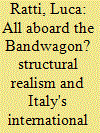

|
|
|
|
|
| Publication |
2012.
|
| Summary/Abstract |
Italy's foreign and security policy since the end of the Cold War is best accounted for by a structural realist framework rather than by liberal and constructivist accounts. More specifically, since unification and also in the post-Cold War period, the main feature of Italy's international collocation has been a dialectical interaction between a structural tendency to "bandwagon" with the hegemonic Power, which can guarantee the protection of Italian interests and forestall the risk of exclusion, and the search for regional autonomy. Italy's structural, dialectical interaction between "bandwagoning" and the search for autonomy is a response to opposite systemic incentives: Italy "bandwagons" every time the international status quo unravels or when a new order is being imposed; it endeavours to assert a more independent role in periods of international stability. During the Cold War, Italy bandwagoned with the United States, whilst European integration and a limited number of initiatives in the Mediterranean saw it attempt to preserve a degree of regional autonomy. The end of the East-West division, replacing scenarios of a nuclear attack or of conventional warfare along the East-West border with the unpleasant prospect of "entrapment" in neighbouring local crises, rekindled the tension between Italy's structural tendency to side with the hegemonic Power and its aspiration to regional autonomy.
|
|
|
|
|
|
|
|
|
|
|
|
|
|
|
|
| 4 |
ID:
071716
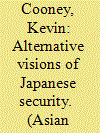

|
|
|
|
|
| Publication |
2005.
|
| Summary/Abstract |
In the post-cold war world Japanese security policy has grasped at nationalistic elements within Japanese society in attempts to "securitize" itself by means of a foreign policy independent of the United States. The role of absolute and relative gains in the making of Japanese foreign and security policy will be examined in light of alternative security issues. Working from International Security: A New Framework for Analysis by Barry Buzan et al., this article will examine Japanese security policy in light of Japan's attempts to securitize itself in non-traditional ways that impact traditional security.
|
|
|
|
|
|
|
|
|
|
|
|
|
|
|
|
| 5 |
ID:
073739
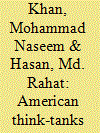

|
|
|
| 6 |
ID:
086511


|
|
|
|
|
| Publication |
2009.
|
| Summary/Abstract |
Twenty years after the fall of the Iron Curtain, it is time to take stock. Have expectations been fulfilled? Not entirely. There are three areas where Europe has clearly lagged: bridging the continent's divisions; establishing a veritable common foreign policy; and fostering a sense of legitimacy for the project of European integration.
|
|
|
|
|
|
|
|
|
|
|
|
|
|
|
|
| 7 |
ID:
085144
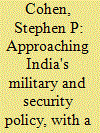

|
|
|
| 8 |
ID:
111726
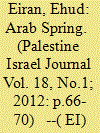

|
|
|
|
|
| Publication |
2012.
|
| Summary/Abstract |
Alongside the risks to Israel, the Arab Spring also offers it opportunities. These include opportunities to advance its strategic objectives as they are defined in "realist" terms of power. But Israel may also be able to advance goals that draw on a "normative" set of preferences, assuming that its objectives include not simply maximizing power but also the conclusion of peace agreements with its neighbors, an end to control over all, or most of, the territories it occupied in 1967, and the strengthening of Israel's liberal-democratic foundations.
|
|
|
|
|
|
|
|
|
|
|
|
|
|
|
|
| 9 |
ID:
125384
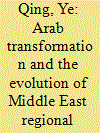

|
|
|
|
|
| Publication |
2013.
|
| Summary/Abstract |
Since its outbreak in the beginning of 2011, the Arab transformation that swept almost the whole middle east has now entered the third year with its geopolitical implications beginning to unfold gradually. When erupted in Tunisia and Egypt, it was driven primarily by internal dynamics and was regarded as a genuine local, bottom up movement in general. Much to people's surprise, incumbent regimes such as the Mubarak regimes in Egypt and Ben Ali regime in Tunisia that were once considered to be durable and formidable were too quick to be overthrown.
|
|
|
|
|
|
|
|
|
|
|
|
|
|
|
|
| 10 |
ID:
153715
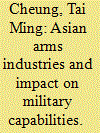

|
|
|
|
|
| Summary/Abstract |
This paper shows how alliance networks have affected defence industrialization policies and processes in countries in the Asia-Pacific region. In countries that enjoyed security assurances from the United States like Japan and South Korea, they are primarily focused industrialization and technology development in civilian sectors, and consequently, defence industrialization is a secondary priority. On the other hand, defence industrialization was/is of higher priority for states that face acute security threats such as China and the Democratic People’s Republic of Korea. In contemporary industrialization processes, the paper concludes that the preference between commercial and defence industrialization is now closing, leading towards an integrated model from which both sectors can benefit.
|
|
|
|
|
|
|
|
|
|
|
|
|
|
|
|
| 11 |
ID:
153711
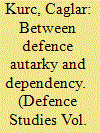

|
|
|
|
|
| Summary/Abstract |
Turkish defence industries have significantly improved their production capabilities since the 1980s. According to the official documents, Turkey reached 54% local production level in 2011. Encouraged by this impressive defence industrial development, the government of Turkey declared that defence industrial autarky, the country’s main goal since the 1980s, would be reached by 2023. This paper evaluates the possibility of Turkey’s defence autarky. Contrary to the existing approaches in the literature that assess technological capabilities and cost-effectiveness, this paper argues that Turkey’s search for defence autarky is hindered by the interplay of institutional deficiencies, dependency on foreign inputs, and the United States’ continuing influence over Turkish politics.
|
|
|
|
|
|
|
|
|
|
|
|
|
|
|
|
| 12 |
ID:
098858
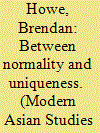

|
|
|
|
|
| Publication |
2010.
|
| Summary/Abstract |
To many observers Japanese decision-making is an enigma that defies conventional analysis. Neither the traditional rational actor model of decision-making, nor alternative pluralist models proposed for the analysis of Western democracies fit the Japanese case. As a result Japanese security policy decision-making is described as 'reactive' or even non-existent. Likewise, the anomaly of Japanese decision-making is ultimately predicted to be resolved through a process of 'normalization' whereby Japanese policy formation evolves into a form that does fit these models. However, this paper contends that the fact that Japan's security decision-making does not fit commonly-used models is due rather to the limitations of those models. Japan's security policy, like that of all states, is gradually evolving, but this does not mean that it is about to become just like the West. This paper addresses how a conjuncture of external factors and internal factors has stimulated important changes in Japanese security policy-making which are frequently missed or misinterpreted by observers. In order to understand Japanese security policy-making, and to chart its future course, a refined cybernetic approach is introduced.
|
|
|
|
|
|
|
|
|
|
|
|
|
|
|
|
| 13 |
ID:
160695
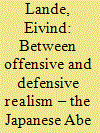

|
|
|
|
|
| Summary/Abstract |
This article gives a broad description of the Japanese second Abe government’s reassurance, arming, and alliance policy toward China. The sources used are mostly elite interviews, newspaper articles, and books from Japan. It gives a realist analysis but also looks at New Komeito’s influence within the coalition government on topics such as the adoption of principles for collective self-defense. While retaining major elements of the defensive realist Yoshida Doctrine, the direction of policy change has been toward a more assertive policy. Japanese perceptions of China’s capabilities and intentions and of the offensive or defensive advantage of the geography of the Nansei Islands and Chinese anti-ship ballistic missiles give an explanation for the shift in policy.
|
|
|
|
|
|
|
|
|
|
|
|
|
|
|
|
| 14 |
ID:
106462
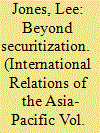

|
|
|
|
|
| Publication |
2011.
|
| Summary/Abstract |
Since the late 1980s, the scope of security policy has widened dramatically to encompass a wide range of 'non-traditional' threats. Southeast Asian states have superficially appeared to embrace this trend, broadening their security discourse considerably. However, they are also often criticized for failing to translate this discursive shift into concrete regional cooperation to tackle these new threats. This article critiques the dominant theoretical framework used to explore the widening of states' security agendas - the Copenhagen School's 'securitization' approach - as unable to account for this gap due to its fixation on security discourse rather than practice. Drawing on state theory and insights from critical political economy, the article argues that the scope of regional security policy is better accounted for by the distinctive nature of state-society relations within Southeast Asia. The argument is advanced using case studies of Southeast Asian states' policies toward Burma, environmental degradation, and border conflicts.
|
|
|
|
|
|
|
|
|
|
|
|
|
|
|
|
| 15 |
ID:
117967
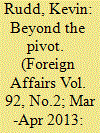

|
|
|
|
|
| Publication |
2013.
|
| Summary/Abstract |
Debate about the future of U.S.-Chinese relations is currently being driven by a more assertive Chinese foreign and security policy over the last decade, the region's reaction to this, and Washington's response -- the "pivot," or "rebalance," to Asia. The Obama administration's renewed focus on the strategic significance of Asia has been entirely appropriate. Without such a move, there was a danger that China, with its hard-line, realist view of international relations, would conclude that an economically exhausted United States was losing its staying power in the Pacific. But now that it is clear that the United States will remain in Asia for the long haul, the time has come for both Washington and Beijing to take stock, look ahead, and reach some long-term conclusions as to what sort of world they want to see beyond the barricades.
|
|
|
|
|
|
|
|
|
|
|
|
|
|
|
|
| 16 |
ID:
131978
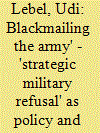

|
|
|
|
|
| Publication |
2014.
|
| Summary/Abstract |
The study shows how 'strategic military refusal' in Israel developed as a rational and institutional means to influence security policies. As opposed to the perspective that sees military refusal as a spontaneous individual act, the study illustrates how organizations operate to distribute military refusal in order to pressure decision-makers to change their military policies. This strategy has proven to be effective when the military is involved with groups that threaten it with refusal - which threatens the military's operational ability and its official and apolitical image. These include soldiers whose civilian authorities, rather than their military commanders, are perceived as an epistemic authority regarding security issues. The case study refers to the impact of strategic military refusal in Israel on security policies and the military doctrine. This was influenced by leftist groups, which, although they belonged to the parliamentary opposition, had dominant presence in the military ranks. Furthermore, the study examines the effect of the use of strategic military refusal on the model of military recruitment.
|
|
|
|
|
|
|
|
|
|
|
|
|
|
|
|
| 17 |
ID:
171589
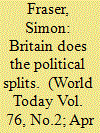

|
|
|
| 18 |
ID:
137768
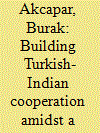

|
|
|
| 19 |
ID:
121554


|
|
|
|
|
| Publication |
2013.
|
| Summary/Abstract |
In December 2006, Felipe Calderón took over as Mexico's new president and made a bold decision to directly confront the drug trafficking organizations that had steadily gained power over the course of his predecessors' terms in office. He started by sending troops into his home state of Michoacán, and over the next six years Mexico's government succeeded in pushing drug-ferrying planes off its airstrips and into airfields in Guatemala and Honduras. Over the course of "Calderón's War" Mexican soldiers captured and killed dozens of high profile cartel leaders. But after more than half a decade of continuous anti-cartel operations, many of the traditional strongholds of the country's drug trafficking organizations have experienced a worrisome deterioration in security. For instance, in the state of Guerrero, as cartel leaders such as the Beltran Leyva brothers and La Barbie were taken down, a destabilizing sequence of inter-cartel competition has led to a string of disturbing violent incidents as well as complaints about robbery and extortion. Over the course of Calderón's presidency it became clear that without complementary improvements in local policing efforts, the anti-cartel strategy would not be able to bring Mexico the long-term security and stability that citizens demand. Fighting the drug cartels is not enough. Effective security policy requires the police to help protect ordinary citizens from "unorganized" crimes such as theft, carjacking, and extortion.
|
|
|
|
|
|
|
|
|
|
|
|
|
|
|
|
| 20 |
ID:
121757
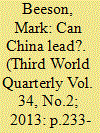

|
|
|
|
|
| Publication |
2013.
|
| Summary/Abstract |
The 'rise of China' is proving to be one of the most consequential developments of the early 21 century One of the key questions it raises is about the impact this historically unprecedented process will have on the East Asian region in particular and the world more generally. Will Chinese policy makers will be able to translate the country's growing material importance into other forms of political power and influence? Equally importantly, will Chinese elites be 'socialised' into the practices and norms of extant institutions, or will they attempt to redefine them to further Chinese foreign policy goals? This paper explores these questions by initially looking at the overall historical context in which East Asian regionalisation has occurred, before considering the operation of some of the more important regional institutions. It is suggested that China's ability to offer regional leadership is constrained both by its own security policies?which are seen as increasingly threatening by many of its neighbours?and by the actions of the USA, which is trying to reassert its own claims to regional leadership. While the outcome of this process is inconclusive, it helps us to understand the more general dynamics reshaping the international system as a result of the emergence of new centres of international power.
|
|
|
|
|
|
|
|
|
|
|
|
|
|
|
|
|
|
|
|
|